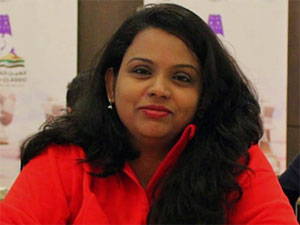


Winning starts with what you know
The new version 18 offers completely new possibilities for chess training and analysis: playing style analysis, search for strategic themes, access to 6 billion Lichess games, player preparation by matching Lichess games, download Chess.com games with built-in API, built-in cloud engine and much more.
With a rating of 2485, Vijayalakshmi Subbaraman, affectionately called Viji, was ranked eleventh in the world in 2006. On 25th of March 2015, her 36th birthday, Sagar Shah caught up with this gem of a player for a candid interview in which she describes her beginnings, the ascent to the top, her way of preparation, the downfall, balancing of roles of a mother, wife and a chess player and the way in which she is trying to make a comeback and achieve her aim of becoming a full-fledged grandmaster.

The first WGM of India: Vijayalakshmi Subbaraman,
Elo 2319 as on March 2015 FIDE rating list
Sagar Shah: So Viji, let’s start right from the beginning. When did you start playing chess and who taught you the game?
Vijayalakshmi Subbaraman: I started learning the game of chess when I was three and half years old, and my dad taught me the rules. He was the first and the only coach I have had.
SS: How strong was your father as a chess player?
VS: It so happened that my father also learnt the game along with me. While I focused more on playing, he had his aims set on coaching me in the best way he could. It was a very raw and interesting process that we went through. Back in 1980s there were hardly any chess books. So many times we were wrong and had to correct ourselves, but it was this learning process that helped me tremendously. Soon I started to not only understand my father's teachings but also successfully implemented them in my games. He helped me a lot psychologically in my chess career. People in the chess circles say that I have a lot of confidence, and I got all of that from my dad.
SS: You have two younger sisters and they too are chess players. The best example of three sisters playing chess are the Polgar sisters. Were you motivated by them at the start of your chess career?
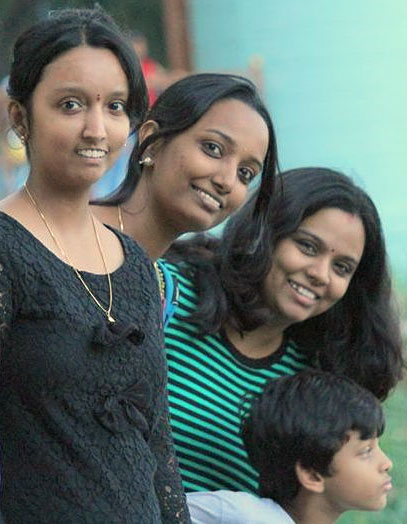
The eldest Vijayalakshmi on the right, Meenakshi
(centre)
and the youngest Banupriya on the left
VS: Anyone would get motivated by the story of Polgars but I would say even before the Polgar sisters, there were the Khadilkar sisters (Vasanti, Jayshree and Rohini) who had amazing achievements.
Our family came from extremely humble backgrounds. My father was the sole bread winner and he had three girls to take care of. It was extremely difficult. Many times I would see the worried look on his face due to the financial burdens. I am sure that the Polgars and Khadilkars, too, had a tough time, but our situation was definitely worse. The condition we were in itself motivated us to try our best.
SS: You have won all the age category tournaments and also were six times Indian National Premier Champion. What was the reason for your phenomenal success?
VS: I was stronger at that time than most of the players. I was able evolve as a player, constantly make changes in my game and I started winning almost everything. An important quality that my father imbibed in me was to always try and play a good and honourable game. He was never upset when I lost the game after playing well. But he would be angry when I played poorly. At no point in my career it was ever about results. I never felt that I am playing chess because I was winning. It was always for the love of the game.
After I won my first National Championships in 1995 there weren’t any celebrations. Immediately there were the Asian Zonals. I was concentrating on that and then I got my WIM title. Then I had to get my rating. The moment I got my rating the journey towards WGM title began. It was followed by the IM title, and then the pursuit for the GM title. It was always about setting higher goals for oneself. It never struck me that I have won so many tournaments. I wanted to improve as a chess player and maybe that was the reason why victories were coming my way.
SS: Whom else do you give the credit for your successes?
VS: For the initial phase of my life my father was my biggest motivation. And what my family has done for me is simply unimaginable. My mother has been the pillar of strength in every possible way. She has always stood by me no matter what. While my dad helped me in my chess she made sure there was a peaceful atmosphere at home conducive for chess.
My husband Sriram is also very supportive. I was able to get all my three GM norms after marriage. My sister Meenakshi has been a shadow to me. In every tournament that I go to she has been there with me as a support. My youngest sister Banu Priya is so lovable. Whenever I lose a game I call her and she always has nice words to say, which cheers me up. And last but not the least, my darling son, Aryan. If I want to achieve anything at present it is for him.
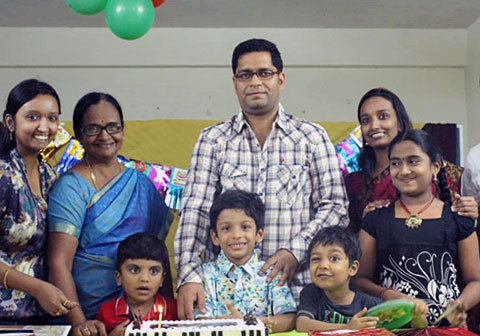
Family has been Vijayalakshmi's biggest support:
husband Sriram with Viji’s mother
and Banupriya to his right, Meenakshi to his left, and son Aryan in front
of him.
SS: What is your best quality as a chess player?
VS: [Speaks softly] I am not afraid. Fortunately my position always seems good to me [Laughs]
SS: That was my next question to you. You are a very tenacious defender and have saved many a losing positions. How do you manage to do that?
VS: I keep seeing winning positions for myself in all the games. [Laughs] And luckily I am able to win. Chess is after all a game and I can beat anyone on any given day because of my fearless attitude. You can say that I am quite an optimist.
This game below is one of Vijayalakshmi’s brilliant defensive efforts. Have a look at how the white queen dances in front of the black king while the two black queens look completely helpless.
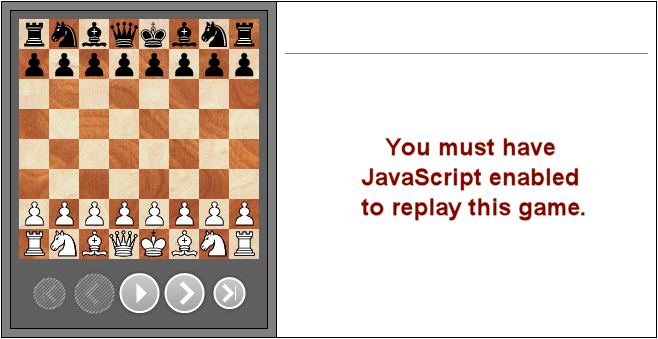
[Event "IND-chT (Women) 9th"] [Site "Kochi"] [Date "2011.02.24"] [Round "3"] [White "Vijayalakshmi, Subbaraman"] [Black "Soumya, Swaminathan"] [Result "1/2-1/2"] [ECO "A06"] [WhiteElo "2454"] [BlackElo "2353"] [Annotator "Sagar Shah"] [SetUp "1"] [FEN "8/1pk5/2p5/8/1P1P4/P1Pq1P2/1K2p3/2n1QB2 b - - 0 46"] [PlyCount "35"] [EventDate "2011.02.22"] [EventRounds "7"] [EventCountry "IND"] [Source "ChessBase"] [SourceDate "2011.05.03"] [WhiteTeam "Air India (W)"] [BlackTeam "PSPB (W)"] [WhiteTeamCountry "IND"] [BlackTeamCountry "IND"] {Black has many ways to win and the player with the black pieces, Soumya Swaminathan, goes for the most obvious move. She was in for a surprise!} 46... exf1=Q (46... Qd1 $1 {would have won the game, but it is not easy to forgo making a queen just for winning a piece.} 47. Qg3+ Kb6 48. Bxe2 {This would turn off many people from the variation, but the computer shows that after} Qd2+ 49. Kb1 Nxe2 $19 {there is no way to avoid mate without giving up the queen.}) 47. Qe5+ $1 {Something amazing happens now. The white queen keeps checking on the dark squares and there is absolutely nothing that the two black queens can do!} Kd7 48. Qg7+ Kc8 49. Qh8+ Kd7 50. Qg7+ Ke6 51. Qe5+ Kf7 52. Qf4+ Kg7 53. Qe5+ Kh6 54. Qf4+ {Look how on every move the white queen stays on the dark squares.} Kg6 55. Qg3+ Kf5 56. Qe5+ Kg6 57. Qg3+ Kh7 58. Qh2+ Kg8 59. Qg3+ Kh8 60. Qe5+ Kh7 61. Qh2+ Kg6 62. Qg3+ Kf7 63. Qf4+ Kg6 {This was an amazing defensive resource found by Vijayalakshmi. I was one of the spectators and was in complete awe of Viji's tenacity. This defensive idea has been imprinted in my mind every since!} 1/2-1/2
SS: You say that you always see winning positions for yourself during the game. Has this lack of objectivity affected your chess?
VS: This attitude has definitely affected my opponents in the post-game analysis sessions [Laughs]. Because when they analyse with me I always see wins for myself and that gets them irritated. They would say this position is bad for you and I wouldn’t understand why. But overall this optimistic approach has helped me positively in my career. If I would understand that the position is bad, I would lose my motivation and heart. So instead of seeing it as lost, I always try to find chances to create counterplay. That’s my way of analysing.
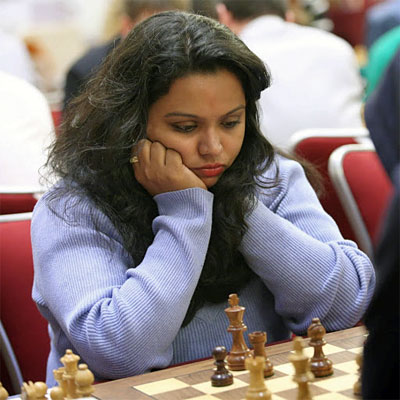
At the Qatar Masters in November 2014. Viji
was able to draw against many
good players like Sweircz, Chanda, Wen Yang, Gao Rui, Xu Jun and Harika.
SS: With your lack of opening preparation how do you manage to play at such a high level and against such a strong opposition?
VS: Presently my openings have gone to the dogs. Earlier when I was at my peak I was preparing a lot and playing the main lines. Post 2007 I haven’t played much, and hence my opening preparation has deteriorated. But thankfully the sheer number of games that I have played when I was young has helped me to a great extent. More than the openings I see what lies in the position. I am not very keen on getting an advantage in the opening and not knowing what to do later. Rather, I would like to get a position where I know what I was doing. This attitude has helped me greatly even when I played against grandmasters. When I used to begin my games with 1.Nf3 or 1.b3 people would laugh and make fun of my opening preparation. But as the game progressed they found it difficult to counter my ideas, and one careless move meant that I would get the advantage. The fact that I was playing positions where I knew what I was doing gave me a lot of confidence. And it gave me the edge which I was expecting. I was not playing the most critical variations that involved a lot of theory, but I knew where my pieces belonged and that has been my approach to the opening.
SS: Does the computer’s evaluation mean nothing to you?
VS: A computer’s evaluations have never meant anything to me. The computer analyses in isolation. When we play at the board there are lot of factors that need to be taken into consideration. For example: going to a different place to play a tournament, having different food to eat, the energy levels for a particular game, standings in the tournament, etc. Many times the computers give an evaluation which doesn’t really matter, because some positions can be very uncomfortable for certain opponents, even if the silicon machine says that it’s better for them. I do not believe in computers assessment, rather I think if the player can handle that position well he should play it.
SS: This is a very welcome change of thought because nowadays everyone is making massive use of engines in their preparation.
VS: Yes, and people have started thinking like the computers! I do use computers but that is only when in a position I am unable to find the tactical combinations and ideas. I use it when I want to avoid blunders in my opening preparation. I do not keep it on all the time and see its evaluation ebb and flow. Once I tried using computers extensively before the tournament and during the games I just couldn’t understand what was going on! It’s true I have lost a lot of games because of lack of computer preparation. But I still do not believe that working with computers all the time is the solution. If I am unable to think on the board I do not know how engines are going to help me.
SS: You have won two individual silver medals in the Olympiad, a feat no other Indian player has been able to achieve.
VS: But has it made any difference? Personally for me it was a great achievement. I shared the podium with the best players of the world. I know what amount of my energy those two tournaments took. I was totally dedicated on my task of playing for my country. I am proud of myself for that fact. But it saddens me that it went totally unrecognized. At the end of the day for any sportsperson it is the encouragement that matters a lot. I am not talking about the remuneration. Forget it. Some adulation, at least from the chess fraternity, would have been highly welcome. According to the Government of India, individual medals do not count for much but everyone knows how difficult it is to get an individual medal in an Olympiad.
SS: Yes, your performance was simply phenomenal!
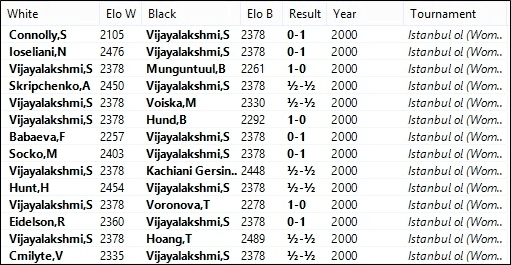
Viji’s performance at Istanbul Olympiad of 2000….
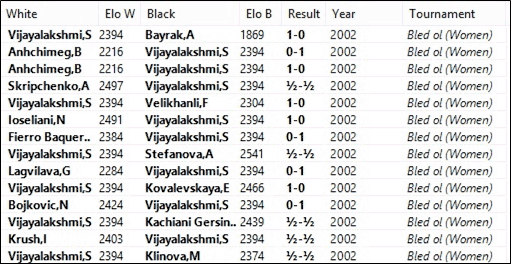
……and at the Bled Olympiad of 2002
VS: If I did not play the last two rounds, I would have got the gold medal in both the Olympiads. I was the team captain and in excellent form. I had to play for my country.
SS: Your rating was 2485 in 2005 and now you are 2318. What happened in these ten years?
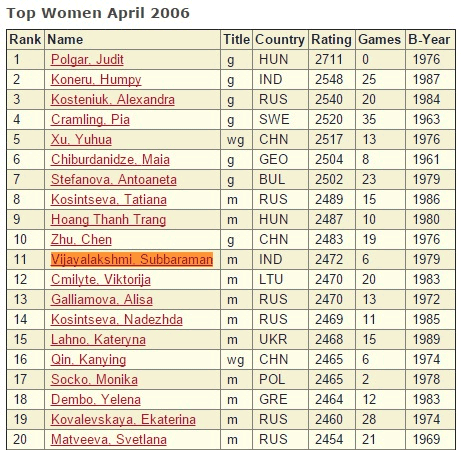
Number eleven in the world on the FIDE rating list of April 2006
VS: I was number nine in the live rating list world at one point. My live rating had reached as high as 2498. Well, my son Aryan happened [Smiles], and my dad passed away. So there were a couple of things in my personal life and it was very difficult to get back on my feet. I hope things are falling back in place now and I hope for good results in the next couple of years. Currently I am not focusing on my rating but I just want to play some good chess. In the past few years I haven’t been able to play as many tournaments as I would have liked.
SS: 2498 on the live rating list and three GM norms – so close to the GM title and now you are 200 points away from it. How do you fight such situations?
VS: It does hurt. And sometimes when you see your old games you feel really bad. You feel that you have lost yourself somewhere. But I believe that I had the game to become a grandmaster – and I still have it in me. If I am able to concentrate better I am sure I will make a comeback.

Viji (right) at the Biel Chess 2005 where she was the joint winner with Almira Skripchenko
SS: So you are confident about becoming a grandmaster?
VS: As I said I am an optimist. I cannot change that about myself. [Laughs] I am not a person who thinks it’s all over.
SS: You married to GM Sriram Jha in the year 2005. You both are the first GM couple of India and Elo-wise you are still the strongest in the nation. Can you tell us something about your story with Sriram?
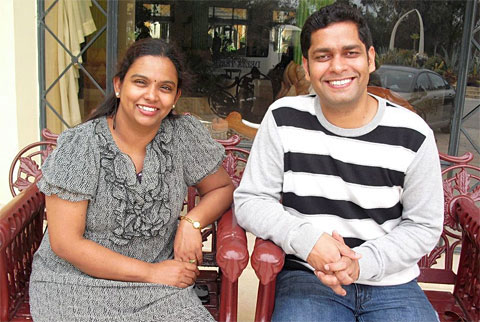
India’s strongest chess couple
VS: It’s a ten-year-old stale story [laughs]. Sriram is three years older than me. We both won the Under-18 National Championships in the same year. We became good friends and slowly things started to work out. We got into a relationship when I was around 21 years old. After about four years of courtship we got married. That’s a short summary of our love story. In 2008 we had Aryan. And now we are a happy little family
SS: What was special about Sriram?
VS: He is very supportive and a huge motivator. He was quite different from other guys that I spoke to during that period, and I liked him very much. Both of us came from very humble backgrounds. That was a binding force. I haven’t really thought much about his qualities because after we had committed to each other it seemed very natural to be in a relationship with him. It was as if we were destined to be together.
SS: Do you both work on chess together?
VS: Never [laughs]. He has helped me in some of the games to prepare, but we have never really worked on chess together when there are no tournaments.
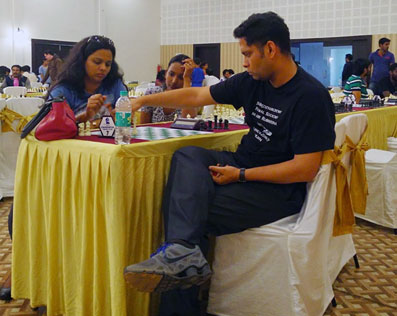
Viji and Sriram analysing together at a rapid tournament in Goa in February 2015
SS: How has your life changed since the birth of your son Aryan?
VS: This is a phase which almost every girl goes through. After marriage they do have to change a bit, but becoming a mother changes your life completely. Your world turns around the child. I have transformed a lot for the better, due to my son. This happens because you have to be a good example for him. The birth of Aryan has given a new meaning to my life. Aryan is the soul who is able to diminish the vacuum that I felt after the death of my father. I look up to him and he is the motivator to my life.
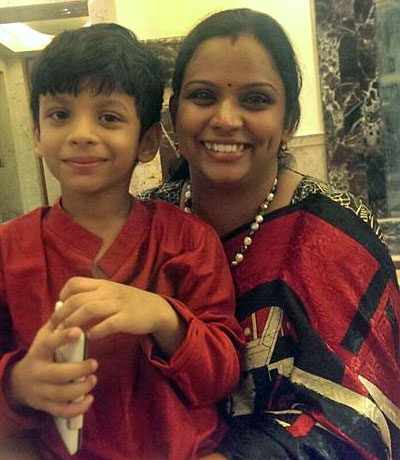
Viji’s cute little motivator!
SS: How do you manage the roles of being a chess player, a wife and a mother?
VS: Currently I am residing in Chennai and Sriram stays in Delhi. So there is not much “a wife kind” of a role that I have to play. We both are busy with our tournaments. Being a mother has taken quite a lot of energy from me. Though I love it completely I must say that it has affected my chess. I am trying my best to manage all the three. I try to draw a median between them. Currently I want to devote more time to chess because I am the happiest when I play tournaments. I do not want to miss out on this happiness.
SS: Who is your idol in chess?
VS: It has always been Kasparov, but now I am really impressed with Carlsen. His totally laid back attitude towards chess is completely different from what Kasparov’s approach was. Kasparov was a firebrand and Carlsen is an ice-cool guy. Kramnik is also considered to be a cool player. But Carlsen is simply unimaginable. I cannot believe that at this age he has such vast knowledge. So after Kasparov if there is someone whom I would like to follow, it’s Carlsen.
SS: Humpy and Harika are the top two Indian women players who are very strong. There is a huge difference between them and others. What is so special about them?
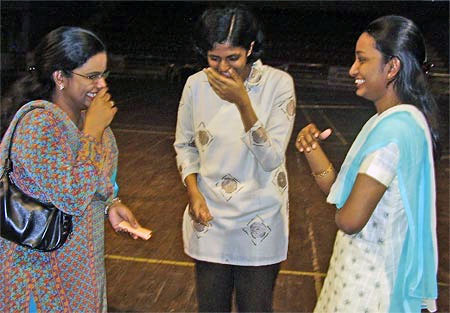
Sharing a light moment: Viji with Harika (centre) and Meenakshi
VS: Humpy is extremely strong. She is a great fighter and never ever gives up. That’s a quality I really like about her. Harika is an extremely solid player and very stable. I wish that she were more attacking because that will help her to score more points. Sometimes people do escape with a draw against her. This is the difference between Humpy and Harika. Basically the former is able to score more points and therefore has the higher rating. Both of them put in a lot of efforts, and their chess understanding is at a very high level. For Humpy I hope that she wins the World Champion title.
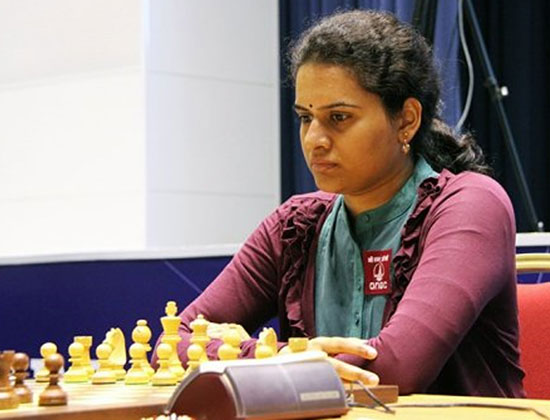
At the time of publishing this article, Humpy
is through to round four at the 2015 Sochi
World Championships, having won all six games of the first three knockout
rounds
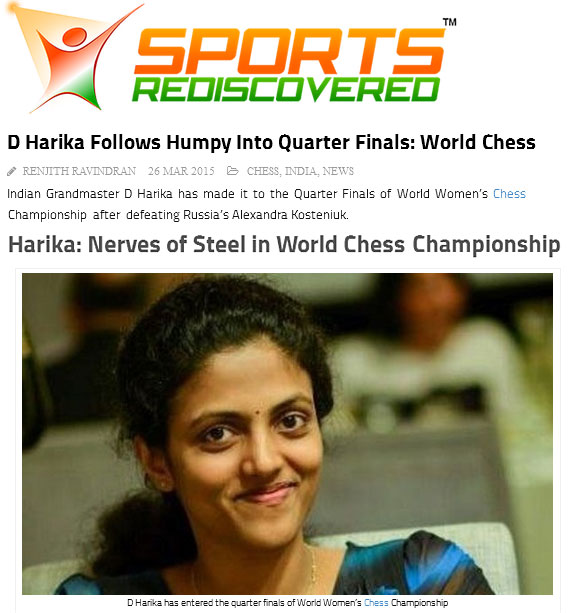
The other great hope of Indian women's chess: Harika in a recent Sports Rediscovered story
SS: Who is the best rising talent among Indian women?
VS: Probably Padmini Rout. The only problem I find with so many talented girls is that there is no stability. They perform really well in couple of tournaments and then the form drops. In the boys section we see a lot of youngsters who have come up. I don’t see that spurt of women players coming up in India.
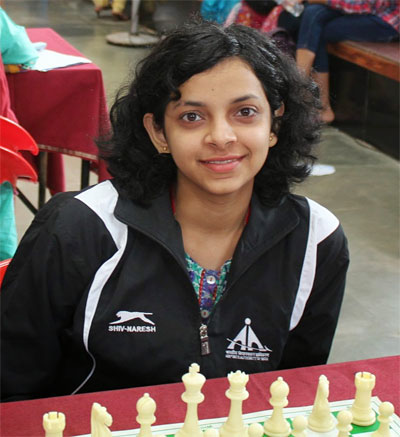
Padmini Rout not only won the individual gold
medal at the Tromso Olympiad
in 2014 but also made a GM norm at the Gibraltar Chess Festival 2015
SS: You have beaten almost all the top Indian players, like Abhijit Kunte, Dibendyu Barua, Pravin Thipsay, R.B. Ramesh and many more. How do they react on losing to a young women player?
VS: In the national A where I beat all of them I was already a pretty strong player. But still I have often encountered a comment that I was lucky or I won by fluke. But don’t these fluke chances arise for them too. I do not get too offended by their comments. If they say I am lucky the only thing I say to myself is we will see next time who is lucky again! [Laughs]
SS: What is your best performance in chess to date?
VS: This is a very tricky question. Because when I was nine years old winning the Under-10 National Championship was the biggest achievement for me. And in 1993 when I won the Sub Juniors, it was the happiest moment because I won it after many attempts. Then the national women’s title, WGM title, Olympiad medals, IM title – one followed after the other. At every point in my life all these achievement gave me a lot of happiness. Some achievements might be small in the eyes of others, but what matters is the kind of motivation I got from these successes.
But if I had to single out one tournament as my favourite then it would be Wipro grandmasters. I was in the process of making my WGM title in that tournament and I would be the first WGM of India, yet I was enjoying my games so much that I was not thinking about the title. The silver medal of 2002 Olympiad was also one the finest moments. In 2000 Olympiad I was lucky in few of the games but in 2002 I was unlucky not to get the gold medal. The Commonwealth in Mumbai in 2006 was also a great tournament. If I wanted I could have opted for the silver medal in the Open section but I went for women’s gold. Finally, In 2007 I went to Cutro [https://www.youtube.com/watch?v=PrU2f4I0JOc&feature=youtu.be], where I had to play against a set of strong GMs. I went there, played against them, beat them and finished first! That tournament gave me lot of recognition because people in the world came to know about me.
SS: Viji, what would be your message to the sports players and chess players all around the world?
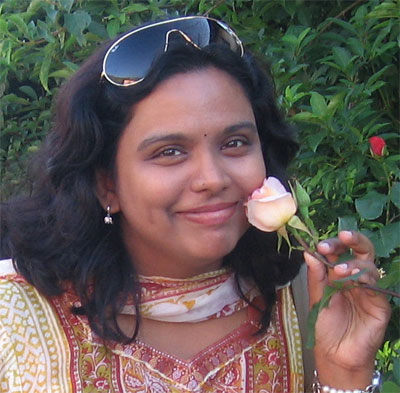
VS: For all the sports players, the most important thing would be not to think of the results and play for the love of the game. That’s what I feel is lacking right now. For chess players, I would say let us abandon computers. Let us try to concentrate on building our own analytical capacity. Everyone is using computers to such an extent that the originality of the game is being lost. Earlier there was a lot of human analysis and fun. Now it has become too professional. There is absolutely no enjoyment left. All the time people are worried about their preparation and not their game in general. I would recommend youngsters should play at least some tournaments without the computer, which might be very difficult for them, but they should take inspiration from Carlsen. You can use Rybka, Houdini or whatever engine you want to prepare against him and yet the World Champion would keep playing in his inimitable cool and calm approach. It’s time for the players to start believing in themselves.
Pictures from the Facebook Page of S. Vijayalakshmi